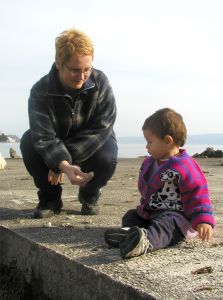By Shoshana Hayman, director of The Life Center/Israel Center for Attachment Parenting, http://lifecenter.org.il
 When educational television tries to teach young children to share, it’s helpful for parents to know how the desire to share really develops in children.
When educational television tries to teach young children to share, it’s helpful for parents to know how the desire to share really develops in children.
My two granddaughters, five and three years old, recently watched a program that talked about sharing. No sooner did the show end, when the girls had a fight over a game they didn’t want to share. Oops! So much for the half-hour lesson on sharing! If I hadn’t learned from Gordon Neufeld, PhD, how children develop the capacity and desire to share, I would have been very frustrated, wondering why the girls weren’t implementing what they had just “learned” five minutes ago from the colorful and engaging television program.
Sharing isn’t something that is learned. True sharing comes from feelings of caring, together with the ability to think about the “yes” and “no” feelings of sharing. In other words, when you care about someone, you will want to share with him.
Ah, but that is not enough! There may be reasons why you don’t want to share at this particular time, and now you must weigh these considerations and decide if you will share, when you will share, and how much you will share. There are sophisticated emotions and thoughts, contradicting each other, that must mix together in the brain during this process: “On the one hand, I’d like to give it to him. On the other hand, I haven’t finished using it myself. Oh, but what if he breaks it? Now I remember I promised my little brother I’d let him use it first!”
In fact, a child’s brain is not even ready for this task of taking all of these things into consideration before the age of five years old, and then, like a muscle, this part of the brain must be exercised so the growing child can take into consideration many things at once. This is called integrative thinking – a level of maturity that takes time to develop, and requires of parents to be patient and trust in the process.
Efforts in creating programs to teach sharing to preschoolers may be doing more harm than good. We are setting up an expectation that children are capable of mature behavior that is not realistic for their age. This creates frustration for parents, which they may dump onto their children. We put pressure on children to make them share by telling them it “makes Mommy happy,” “you’re the big girl now and you should know better,” or “if you want people to share with you…” without realizing that this hijacks the child’s own budding spirit of wanting to share with others. Now, he may be sharing, not because he cares and wants to, but rather because he wants to gain approval. This kind of sharing turns the quality of giving to others into a selfish act rather than an altruistic one. The child’s own ability to decide if he can indeed share and still respect his own limits has now been compromised.
It’s important to remember that when we expect a child to share before he is developmentally ready, we may be inhibiting his true spirit of caring. Instead of sharing because he cares, he now shares because he wants to gain approval, thus turning sharing into a selfish act rather than an altruistic one. We can be assured that if we are caring toward our children and guide them in a spirit of caring, their own spirit of caring will develop, and as they mature and develop integrative thinking, we will see the fruits: caring that comes naturally and spontaneously from their hearts.
 From API’s Publications Team
From API’s Publications Team